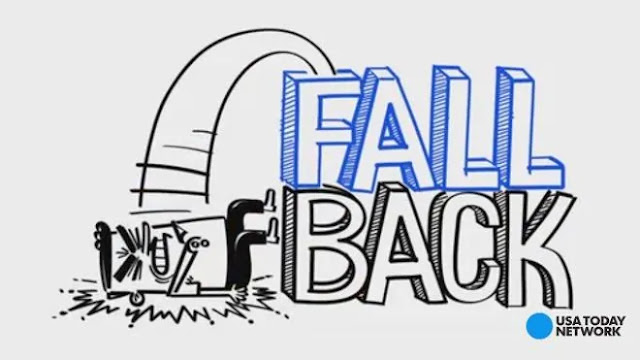#Daylightsavingtime #FallBack #Sleep, #DST
Daylight saving time ends on Sunday, at 2 a.m. — the official hour to set all of our clocks back to standard time. But most of us will probably "fall back" before we go to bed Saturday night.
That's unless you reside in the states of Arizona (except the Navajo Nation) or Hawaii. Or the U.S. territories of American Samoa, Guam, Puerto Rico, and the Virgin Islands do not observe daylight saving time.
On the bright side, we gain an extra hour of sleep. But many 9-to-5 office workers face a dark side too: Not seeing much daylight on weekdays until next spring.
Here are seven things to know about daylight saving time:
1.) It's not plural. First things first. It's daylight saving time not saving's or savings time. It's singular.
2.) When is it exactly? Since 2007, daylight saving time begins on the second Sunday of March and ends on the first Sunday of November. Previously, it had started on the last Sunday of April and ended on the last Sunday of October.
3.) Never about the farmers. It was not started to help America's farmers. According to timeanddate.com, daylight saving time was first used in 1908 by a few hundred Canadians in Thunder Bay, Ontario. But Germany popularized DST after setting the clocks forward on April 30, 1916, to save coal during World War I.
Daylight saving time became a national standard in 1966 when President Lyndon B. Johnson signed the Uniform Time Act, which was established to continue conserving energy. The thinking was if it's light out longer, that's less time you'll need to use the lights in your house.
4.) Do all states observe DST? Presently, Hawaii and Arizona are the only two U.S. states that do not observe daylight saving time. Neither does the U.S. territories of Puerto Rico, Virgin Islands, Guam, American Samoa, and Northern Marina Islands.
5.) Which states want out? Seven states — Alabama, Arkansas, Nevada, Oregon, Tennessee, Washington, and Florida — have approved legislation to make daylight saving time permanent. However, these states still need the OK from Congress to enact the change.
6.) What about the rest of the planet? Daylight Saving Time is used in over 70 countries worldwide and affects over one billion people yearly. The beginning and end dates vary from one country to another.
7.) Next year? Daylight saving time will return in March when we will “spring forward” and lose an hour of sleep.
By Ginny Beagan and Catie Wegman usatoday.com


Comments
Post a Comment